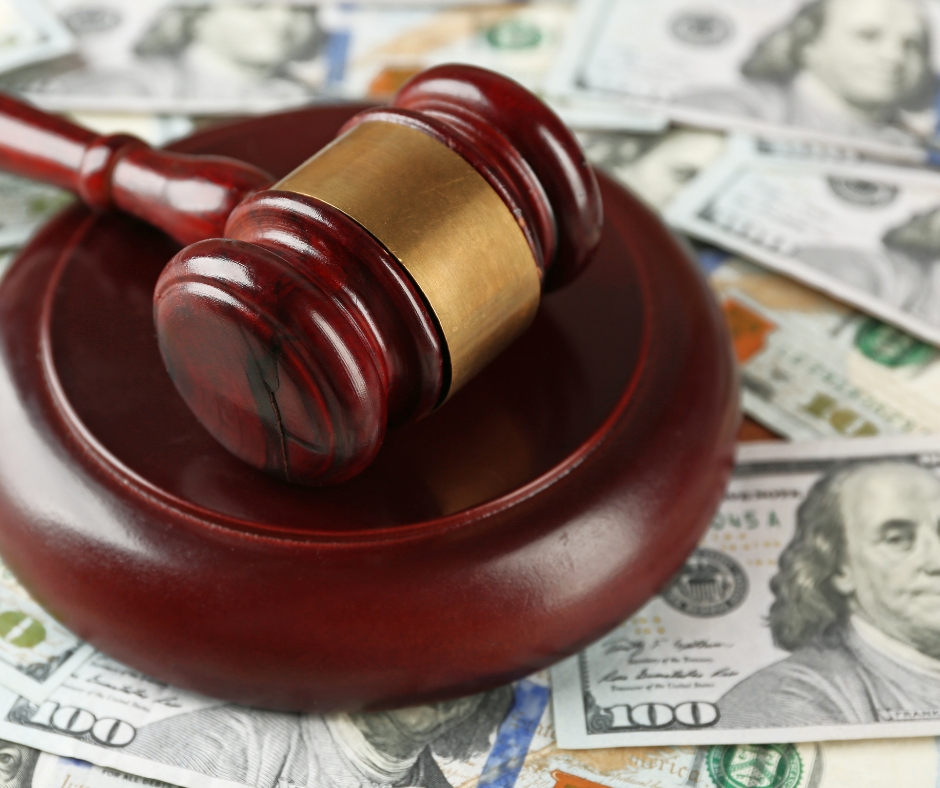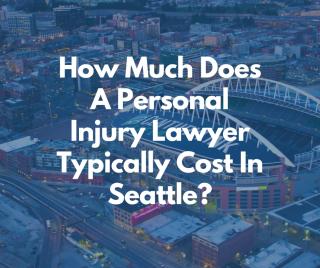The
Seattle personal injury attorneys at Metier Law Firm know that if you've been injured in an accident in Seattle and are considering legal action, one of your primary concerns may be the cost of hiring a personal injury attorney. Understanding the typical fee structures and costs associated with personal injury representation can help you make an informed decision about pursuing your case. In this blog post, our
Seattle personal injury law firm will break down the common cost structures for
personal injury lawyers in Seattle and factors that may influence these costs.
Contingency Fee Arrangements
The most common fee structure for
personal injury attorneys in Seattle, as
.jpg)
well as throughout
Washington state, is the contingency fee arrangement. This payment model is designed to make legal representation accessible to individuals who may not have the financial means to pay for a lawyer upfront, especially when dealing with medical bills and lost wages due to their injury.
Under the contingency fee system:
1.
You pay no upfront costs or hourly fees: This means you can pursue your case without worrying about ongoing legal bills. It allows you to focus on your recovery while your lawyer handles the legal aspects of your claim.
2.
The lawyer only gets paid a fee if they win your case or secure a settlement: This arrangement aligns the lawyer's interests with yours, as their compensation is directly tied to the success of your case. It provides a strong incentive for the lawyer to work diligently on your behalf.
3.
The lawyer's fee is a percentage of the amount recovered: If your case is successful, the lawyer's fee is deducted from the settlement or court award, not from your pocket.
Typically, contingency fees for injury lawyers in Seattle range from 33% to 40% of the total settlement or court award. For example, if your case settles for $100,000, and your lawyer's contingency fee is 33%, they would receive $33,000, and you would keep $67,000. This percentage can vary based on several factors, which we'll explore in more detail.
It's important to note that the exact percentage can vary based on:
•
The complexity of your case: More complex cases involving multiple parties, disputed liability, or severe injuries may warrant a higher percentage due to the increased risk and effort required.
•
The amount of time and resources required: Cases that demand extensive investigation, expert testimony, or prolonged negotiations may justify a higher contingency fee.
•
Whether the case goes to trial or settles out of court: Cases that proceed to trial generally involve more work and risk for the attorney, which may be reflected in a higher contingency percentage.
•
The lawyer's experience and track record: Highly experienced attorneys with a proven history of securing substantial settlements or verdicts may charge higher percentages.
Some injury attorneys in Seattle may use a sliding scale for their contingency fees, where the percentage increases if the case progresses to certain stages. For example:
• 33% if the case settles before filing a lawsuit
• 35% if a lawsuit is filed but settles before trial
• 40% if the case goes to trial
This sliding scale approach reflects the additional time, effort, and risk

involved as a case progresses through the legal system. It's important to discuss this structure with your lawyer and ensure you understand how it might apply to your case.
Additionally, some attorneys may be willing to negotiate their contingency fee percentage, especially for high-value cases. Don't be afraid to discuss the fee structure during your initial consultation and ask if there's any flexibility.
It's worth noting that
Washington State Rules of Professional Conduct require that contingency fees be reasonable. Factors considered in determining reasonableness include the time and labor required, the difficulty of the questions involved, and the skill requisite to perform the legal service properly.
When considering a contingency fee arrangement, be sure to ask your potential lawyer:
• What is included in the contingency fee? (e.g., Does it cover all legal work, or are there additional charges?)
• How are case expenses handled? (e.g., Are they advanced by the lawyer and then deducted from the settlement, or are you responsible for paying them as they arise?)
• Is the contingency fee calculated before or after case expenses are deducted?
• Are there any circumstances under which you might owe the lawyer money even if you don't win your case?
Remember, while the contingency fee percentage is an important factor in choosing a personal injury lawyer in Seattle, it shouldn't be the only consideration. Finding a good personal injury attorney means also looking at the lawyer's experience, track record, and ability to effectively handle your specific type of case in order to get a favorable outcome for your personal injury claim.
Additional Costs and Expenses
While the contingency fee covers the lawyer's time and expertise, there are can be additional costs associated with pursuing a personal injury claim. These may include:
- Filing fees
- Expert witness fees
- Medical record retrieval costs
- Deposition expenses
- Accident reconstruction fees
- Postage and copying costs
Many personal injury attorneys in Seattle will advance these costs on your behalf and then deduct them from your settlement or award. However, practices can vary, so it's crucial to discuss how these expenses will be handled when you first meet with a lawyer.
Hourly Rate (Less Common)
While rare in personal injury cases, some Seattle lawyers may work on an hourly basis. Hourly rates for experienced personal injury lawyers in Seattle can range from $200 to $500 or more per hour. This arrangement is more common in cases where liability is unclear or when the client has the financial means to pay ongoing legal fees.
Flat Fee (Very Rare)
Flat fees are extremely uncommon in personal injury cases due to their unpredictable nature. However, a lawyer might charge a flat fee for a specific service, such as reviewing your case or writing a demand letter.
Factors Affecting Costs
When considering the cost of hiring personal injury representation in Seattle, it's important to understand that several factors can influence the overall expense. These factors not only affect the lawyer's fees but also the resources required to pursue your case effectively. Let's delve deeper into each of these factors:
Case Complexity: More complex cases involving severe injuries, multiple parties, or disputed liability may require higher fees due to increased time and resources needed.
For instance:
• Severe injuries might necessitate extensive medical documentation, expert testimonies, and long-term care projections, all of which increase the workload and costs.
• Cases with multiple parties (e.g., a multi-vehicle accident) can complicate liability determination and negotiation processes.
• Disputed liability cases may require accident reconstruction experts, additional witnesses, or more intensive investigation, driving up costs.
In these situations, lawyers may charge higher contingency fees or require larger retainers to account for the additional work and risk involved.
Lawyer's Experience: Highly experienced attorneys with strong track records may charge higher fees, but they may also be more likely to secure larger settlements.
Consider:
• Years of practice in personal injury law
• Success rate in similar cases
• Reputation among peers and in the legal community
• Specialized knowledge or certifications
While an experienced lawyer might charge a higher percentage, their expertise could potentially result in a significantly larger settlement, potentially offsetting the higher fee percentage.
Case Value: Cases with potentially high damages may justify higher contingency percentages due to the increased risk and effort involved.
Factors influencing case value include:
• Severity and long-term impact of injuries
• Lost wages and future earning capacity
• Medical expenses (current and projected)
• Pain and suffering
• Property damage
Lawyers may be willing to invest more resources in high-value cases, knowing that the potential payout could be substantial. However, they may also require a higher percentage to justify the increased risk and resource allocation.
Timeline: Cases that settle quickly may result in lower overall costs compared to those that go to trial.
Consider:
• Pre-litigation settlements are often the least expensive option
• Cases that require filing a lawsuit but settle before trial incur moderate costs
• Cases that go to trial are typically the most expensive due to court fees, expert witness costs, and increased attorney time
Some lawyers use a sliding scale fee structure that increases as the case progresses through these stages, reflecting the additional work required.
Case Strength: The strength of your case can influence costs in several ways:
• Strong cases with clear liability may settle more quickly, reducing overall costs
• Weaker cases might require more resources to build a compelling argument, potentially increasing costs
• Some lawyers might be willing to take on riskier cases for a higher contingency fee
Insurance Company Involvement: The specific insurance companies involved can impact costs:
• Some insurance companies are known for fair and quick settlements, which can reduce overall legal costs
• Others might be more likely to dispute claims, potentially increasing the time and resources needed to resolve the case
The
Washington State Bar Association has published an
FAQ booklet that can also help you understand the factors you should consider when looking for a reputable personal injury attorney.
Understanding these factors can help you make a more informed decision when choosing a personal injury lawyer in Seattle. Remember, while cost is an important consideration, it shouldn't be the only factor in your decision. The right lawyer for your case should offer a balance of experience, resources, and a fee structure that aligns with your specific situation and the potential value of your case.
Understanding Your Agreement

Before hiring a personal injury lawyer in Seattle, it's crucial to thoroughly review and understand the fee agreement.
Washington State Courts require that contingency fee agreements be in writing and clearly explain how fees and costs will be calculated and paid.
Don't hesitate to ask questions about:
- The exact percentage of the contingency fee
- How case expenses will be handled
- Any potential increases in the fee percentage
- What happens if you terminate the agreement early
Conclusion
While trying to find a personal injury lawyer in Seattle and the costs for one can seem daunting, the contingency fee structure makes legal representation accessible to many who couldn't otherwise afford it, and this is the fee structure Metier Law Firm uses with its clients. Remember, most reputable personal injury lawyers offer free initial consultations, allowing you to discuss your case and understand potential costs before making any commitments.
For your free and confidential consultation with our Seattle personal injury lawyers at Metier Law Firm, call us toll-free today at (866) 377-3800 or visit us online to schedule your consultation at
metierlaw.com.
By understanding the typical cost structures and factors that influence fees, you can make a more informed decision when choosing a personal injury lawyer in Seattle. Always prioritize finding an experienced attorney who communicates clearly about their fee structure and has a track record of success in cases similar to yours.



.jpg) well as throughout Washington state, is the contingency fee arrangement. This payment model is designed to make legal representation accessible to individuals who may not have the financial means to pay for a lawyer upfront, especially when dealing with medical bills and lost wages due to their injury.
well as throughout Washington state, is the contingency fee arrangement. This payment model is designed to make legal representation accessible to individuals who may not have the financial means to pay for a lawyer upfront, especially when dealing with medical bills and lost wages due to their injury. involved as a case progresses through the legal system. It's important to discuss this structure with your lawyer and ensure you understand how it might apply to your case.
involved as a case progresses through the legal system. It's important to discuss this structure with your lawyer and ensure you understand how it might apply to your case. Before hiring a personal injury lawyer in Seattle, it's crucial to thoroughly review and understand the fee agreement. Washington State Courts require that contingency fee agreements be in writing and clearly explain how fees and costs will be calculated and paid.
Before hiring a personal injury lawyer in Seattle, it's crucial to thoroughly review and understand the fee agreement. Washington State Courts require that contingency fee agreements be in writing and clearly explain how fees and costs will be calculated and paid.
